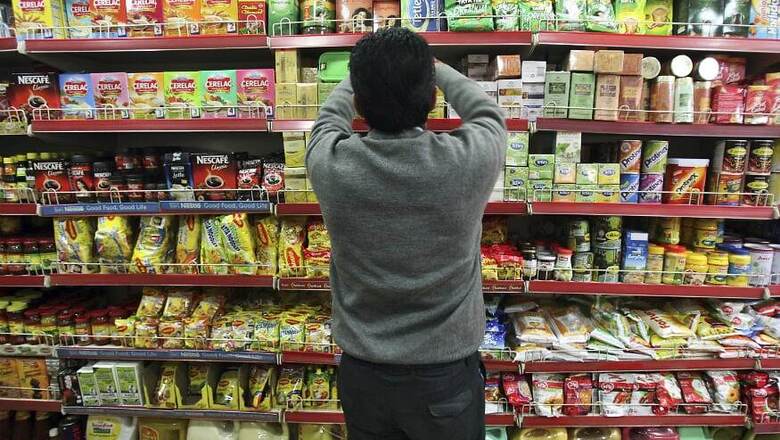
views
The country is currently under a nationwide lockdown in order to check the spread of Covid-19. The government has issued guidelines to ensure supply of essential commodities to the people. Transport services and cross-border land movement have been suspended in most states with the exception of transportation involved in the supply chain of essential items.
Initially, disruptions in the supply chain occurred due to government guidelines not getting implemented correctly by local authorities. Presently, most major disruptions have been addressed through proactive steps by central and state governments.
Some unforeseen problems still need to be tackled. Labour shortage is one such issue. The logistics sector in India alone employs more than 40 million people and contributes $200 billion plus to the economy. Most of the workers are unskilled, engaged in manual loading, unloading and material handling. Technological developments have been scarce in these areas as the manual labour is cheaper and easily available. Due to safety concerns and lockdown restrictions, workers involved in the supply chain of essential commodities are often unable to continue working.
Movement of food grains, fruits and vegetables has been severely hampered. Prices of food grains and vegetables have been reported to have increased by up to 20% in some major cities. Azadpur Mandi, Asia’s largest fruit and vegetable wholesale market, is only able to execute 25% of its capacity. Traders point out that when trucks are filled, they are allowed to pass by authorities, but when they have to return empty to restock produce from the farms, they are often stopped. This situation should improve after the central government announced that empty trucks would be allowed to ply as long as they produce their E-way GST bills.
A further problem arises because the trucks often carry their own labourers to load goods from the farm, but due to social distancing measures these labourers are no longer allowed to travel in the trucks. Arranging local labour has been difficult in a few cases. Similar to vehicles, there may be a need to issue passes for labourers involved in the supply chain of essential agricultural commodities.
The dairy and poultry industry have been mainly affected due to lack of demand. Only raw milk consumed by households has been considered an essential commodity. However, a large part of the demand for milk comes from its use as a raw material in sweet shops, bakeries, tea stalls and ice cream production. The reduction in demand has led to a 30% drop in milk procurement in some places. This has led to instances of dairy producers throwing away their products since they can’t find a buyer. State governments could consider including sweet shops as essential services: this has already been done in West Bengal. Government agencies could also directly procure surplus milk and transport it to thousands of migrant workers currently unable to access it.
FMCG companies have focused their operations on producing essential items like personal hygiene products and packaged foods. Major supply chain disruptions for these products occurred because trucks carrying goods to distributors were getting stopped due to lack of clarity regarding what constitutes essential items. Vehicles used by these companies to transport raw and packaging materials were also stuck at state borders. A recent letter from the ministry of home affairs directing authorities to allow transportation of all goods, without distinction of essential and non-essential, could help ease the problems associated with truck movement. The problem of labour shortages in production and distribution are still likely to persist.
Production is down by 20-40% in some units due to shortage of manpower. Workers have either returned home or are too afraid to come to work. There is also a problem of transporting people to work. The usual public transport options are not functional and companies often do not have enough vehicles for conveyance of all workers. The requirement of social distancing measures also means the available vehicles cannot be utilised at full capacity. Government-owned buses currently lying idle could be used to transport workers while maintaining social distancing.
Establishing safety protocols in the factories and educating workers could help assuage their fear. In China, many factories have already adopted additional protocols such as body temperature checks, disinfecting buildings, reducing physical meetings and forcing workers to have meals in isolation. A further step could also involve providing special passes to these workers so that they are not stopped by authorities while trying to get to work.
Delivery of essential goods through e-commerce has been allowed under the government guidelines.
However, e-commerce deliveries saw a 40% drop and return to origin of orders increase by 330% in the first few days after the lockdown. Restrictions on movement of delivery personnel was the initial reason for failed deliveries. These services seem to be faring better after state governments set up platforms for e-commerce companies to obtain special passes to allow unrestricted movement.
The leading e-commerce companies pointed to manpower shortages as the biggest challenge moving forward. Manpower issues have led to dearth of delivery personnel and people to run logistic operations. Some companies have taken initiatives to help calm fears of workers so that they can continue working. These include providing safety equipment, meal packets and private insurance to truck drivers and labourers.
Government agencies along with the private sector has already taken significant steps to ensure essential items reach the public. Some more innovative solution could further help smoothen operations. Ensuring worker safety and reassuring workers is essential. The government can consider providing insurance for all workers involved in essential services, similar to that provided for health workers.
To prevent transmission of the coronavirus, strong protocols have to be established to identify workers with possible symptoms. Operational patterns will need to be altered so that productivity can be achieved with minimal contact between workers. The National Highways Authority of India (NHAI) has decided to make food and water arrangements for truck drivers at toll plazas. This arrangement should be extended to include workers involved in intracity movement of goods as well.
A large number of migrant workers have moved back to their hometowns as they were unable to work during the lockdown. Agriculture and logistics could be the hardest hit as these sectors are largely informal and dependent on migrant labour. When rail and bus services resume, these workers will begin to move back to cities and towns.
Strict safety protocols for rail and public transport will have to be established to stop further spread of the virus. Government agencies will also need to coordinate with the private sector to come up with alternate transport options for workers.
(Shri Prakash is Distinguished Fellow, TERI and Promit Mookherjee is Research Associate, Centre for Sustainable Mobility, TERI. Views expressed are personal)



















Comments
0 comment